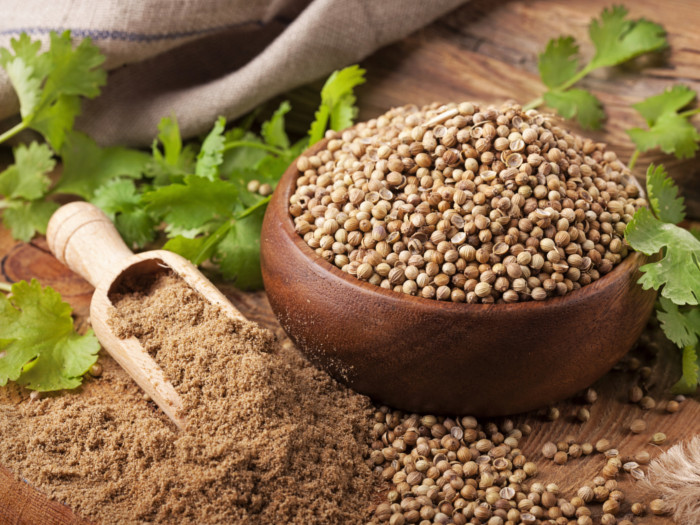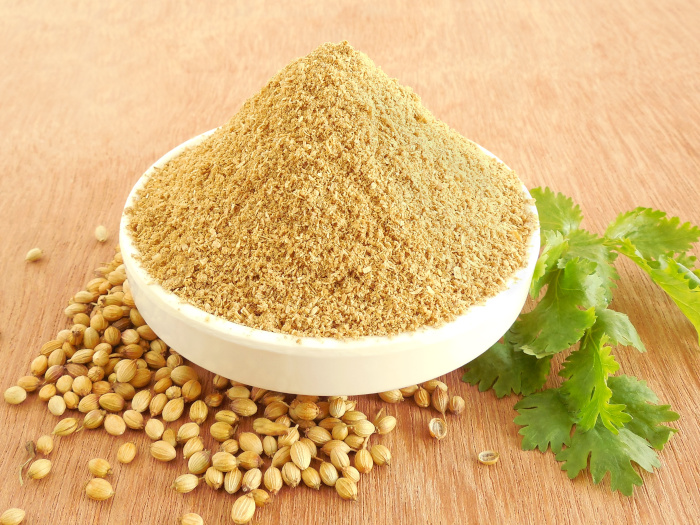If the world of spices was a stage, then coriander powder would always be the supporting actor we’d be rooting for. With its nutty, warm, and slightly citrusy flavor, ground coriander is that secret ingredient, which breathes life into a boring dish or makes the signature delicacies taste even better. An essential spice used predominantly in Indian, Spanish, Latin, and Mexican cuisines, it is used in making sauces, chilis, marinades, spices, curries, and spice rubs among other things. That said, let us take a look at how to make fresh coriander powder at home so that we never fall short of it in our pantry. [1]
What Is Coriander Powder?
Coriander powder is derived by blending roasted seeds of the coriander plant (Coriandrum sativum), which belongs to the parsley family. Roasting or dry frying the seeds prior to grinding them helps retain their aromatic flavor. While you can buy readymade coriander powder at the stores, it is always best to buy whole dried seeds and grind them as and when needed. The freshly ground form of the condiment has a rich aroma that its readymade counterpart starts to lose if stored for a long period of time. Usually, grounded coriander stays for nearly six months, whereas the seeds can remain fresh for a year. [2]
How To Make Coriander Powder?
To make coriander powder at home, it is always advisable to select seeds that are crisp and fresh with pleasing color. If the seeds appear to be too dry as a bone and dull in color, it’s best to avoid them altogether. Select fresh seeds that have a distinctive aroma. Before you use a pestle or blender to grind them, dry roast them slightly over medium-high heat until they release a warm aroma. To understand the process better, let’s look at the detailed recipe below with some interesting recipe notes.

Homemade Coriander Powder Recipe
Ingredients
- 2 cups of fresh coriander seeds
Instructions
- To make freshly ground coriander powder, take a cup of aromatic, fresh coriander seeds and dry roast them till they turn a shade darker and give out a distinct earthy and somewhat citrusy aroma. This goes to show that the seeds are well-roasted and perfectly ready to be blended.
- Thereafter, allow them to cool a little before using a spice blender or a pestle to grind them into a powdered form. It is best to prepare the powder in batches and use it accordingly than making it in bulk and storing it for a long period of time. This way the freshness remains intact.
- Adding a pinch of this powder to curries or other dishes in question will give the dishes a characteristic mild and earthy flavor. Coriander powder goes well with bell peppers, onions, tomatoes, and potatoes. They also pair well with other spices like cumin, chili, turmeric, cinnamon, and curry powder.

Notes
- Always remember that freshly ground homemade coriander powder has a longer shelf life and remains fresh for a longer duration. They contain no additives or preservatives and eventually enhance the overall flavor of the food.
- If you have to store it, it is advisable to do so in an airtight container and keep it in a cool and dry place. This way the powder will remain fresh for 6 months.
Coriander Powder Benefits & Substitutes
Coriander powder is also known for its health benefits that include lowering blood sugar levels, boosting immunity, fighting various infections, and improving skin and heart health among other things. When consumed with water, ground coriander will help alleviate gas and aid in digestion. Given that the powder is obtained by grinding the seeds, we can best understand the benefits in detail by reading our article, 7 Amazing Benefits Of Coriander Seed. [3]
Coriander powder is a very versatile condiment and sometimes you may find it very difficult to find a replacement. There are a few substitutes of coriander powder that can help save your dish if you run out of this popular spice. These include cumin, caraway seeds, garam masala, oregano, and curry powder among others. To know these substitutes in detail, read our article, 5 Incredible Ground Coriander Substitutes.
How To Use Coriander Powder?
Here are some of the recipes where you can use ground coriander:

